
Lorenzo di Piero de' Medici, known as Lorenzo the Magnificent, was an Italian statesman, the de facto ruler of the Florentine Republic, and the most powerful patron of Renaissance culture in Italy. Lorenzo held the balance of power within the Italic League, an alliance of states that stabilized political conditions on the Italian Peninsula for decades, and his life coincided with the mature phase of the Italian Renaissance and the golden age of Florence. As a patron, he is best known for his sponsorship of artists such as Botticelli and Michelangelo. On the foreign policy front, Lorenzo manifested a clear plan to stem the territorial ambitions of Pope Sixtus IV, in the name of the balance of the Italic League of 1454. For these reasons, Lorenzo was the subject of the Pazzi conspiracy (1478), in which his brother Giuliano was assassinated. The Peace of Lodi of 1454 that he supported among the various Italian states collapsed with his death. He is buried in the Medici Chapel in Florence.

Pope Pius IV, born Giovanni Angelo Medici, was head of the Catholic Church and ruler of the Papal States from 25 December 1559 to his death, in December 1565. Born in Milan, his family considered itself a branch of the House of Medici and used the same coat of arms. Although modern historians have found no proof of this connection, the Medici of Florence recognized the claims of the Medici of Milan in the early 16th century.

Gian Giacomo Medici or Jacopo de' Medici was an Italian condottiero who became a noted Spanish general, Duke of Marignano and Marquess of Musso and Lecco in Lombardy.

Jacques Courtois or Giacomo Cortese, called il Borgognone or le Bourguignon was a Franche-Comtois–Italian painter, draughtsman, and etcher. He was mainly active in Rome and Florence and became known as the leading battle painter of his age. He also created history paintings and portraits. He became a Jesuit later in life but continued to paint.

Giacomo Medici, Marchese del Vascello was an Italian nobleman, patriot and soldier.
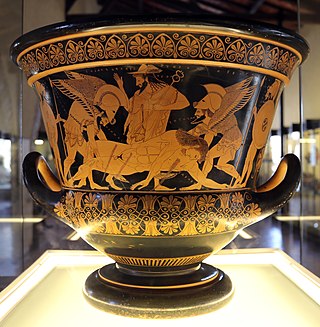
The Euphronios Krater is an ancient Greek terra cotta calyx-krater, a bowl used for mixing wine with water. Created around the year 515 BC, it is the only complete example of the surviving 27 vases painted by the renowned Euphronios and is considered one of the finest Ancient Greek vases in existence.
Robert Emmanuel Hecht, Jr. was an American antiquities art dealer based in Paris.
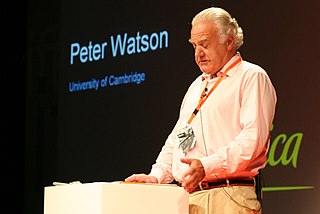
Peter Frank Patrick Watson is a British intellectual historian and former journalist, now perhaps best known for his work in the history of ideas. His journalistic work includes detailed investigations of auction houses and the international market in stolen antiquities.
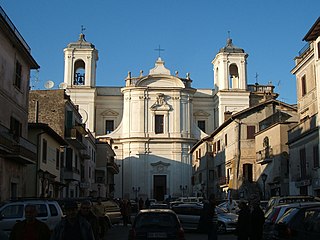
Vicovaro is a comune (municipality) in the Metropolitan City of Rome in the Italian region Lazio, located about 45 kilometres (28 mi) northeast of Rome.

The Basilica of San Giovanni dei Fiorentini is a minor basilica and a titular church in the Ponte rione of Rome, Italy.
Giacomo Medici is an Italian antiquities smuggler and art dealer who was convicted in 2004 of dealing in stolen ancient artifacts. His operation was thought to be "one of the largest and most sophisticated antiquities networks in the world, responsible for illegally digging up and spiriting away thousands of top-drawer pieces and passing them on to the most elite end of the international art market".
Robin Symes was a British antiquities dealer who was unmasked as a key player in an international criminal network that traded in looted archaeological treasures. Symes and his long-term partner Christo Michaelides met and formed a business partnership in the 1970s, and Symes became one of Britain's most prominent and successful antiquities dealers. However, after Michaelides died accidentally in 1999, his family took legal action to recover his share of the Symes company's assets, and when the matter went to trial, Symes was found to have lied in his evidence about the extent and value of his property; he was subsequently charged with and convicted of contempt of court, and sentenced to two years' imprisonment, of which he served seven months. Further investigations by Italian authorities revealed in January 2016 that Symes's involvement in the illegal antiquities trade had been even more extensive than previously thought, and that he had hidden a vast hoard of looted antiquities in 45 crates at the Geneva Freeport storage warehouse in Switzerland for 15 years to conceal them from Michaelides's family.

Giacomo Boncompagni was an Italian feudal lord of the 16th century, the illegitimate son of Pope Gregory XIII. He was also Duke of Sora, Aquino, Arce and Arpino, and Marquess of Vignola.
Medici, Medicis, The Medicis, or The House of Medici were a prominent medieval Florentine family.
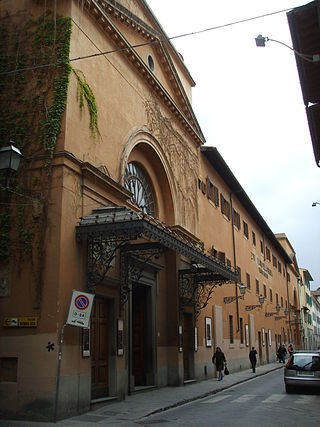
Antonio Salvi was an Italian physician, court poet and librettist, active mainly in Florence, Italy. He was in the service of the grand-ducal court of Tuscany and the favourite librettist of Prince Ferdinando de' Medici. Salvi was one of the developers of the opera seria.

Italian garden typically refers to a style of gardens, wherever located, reflecting a number of large Italian Renaissance gardens which have survived in something like their original form. In the history of gardening, during the Renaissance, Italy had the most advanced and admired gardens in Europe, which greatly influenced other countries, especially the French formal garden and Dutch gardens and, mostly through these, gardens in Britain.

The Brivio de Brokles were a Hungarian and Italian noble family, supposed to be a branch of the more famous Brivio family from Milan.
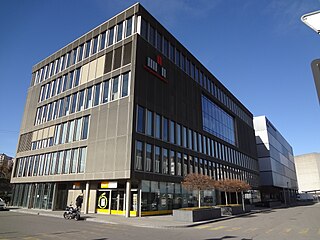
Geneva Freeport is a warehouse complex in Geneva, Switzerland, for the storage of art and other valuables and collectibles. It is the oldest and largest freeport facility, and the one with the most artworks, with 40% of its collection being art with an estimated value of US$100 billion.
Giacomo is an Italian given name corresponding to English James. It is the Italian version of the Hebrew name Jacob.
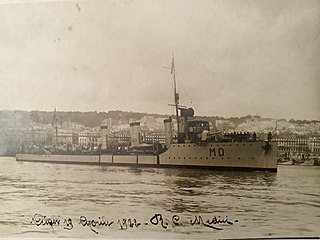
Giacomo Medici was an Italian La Masa-class destroyer. Commissioned into service in the Italian Regia Marina in 1918, she served in the final weeks of World War I. During the interwar period, she took part in operations during the Corfu incident in 1923 and was reclassified as a torpedo boat in 1929. During World War II, she took part in convoy escort operations in support of the Greco–Italian War as well as in the Mediterranean campaign until she was sunk in 1943.














